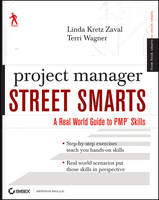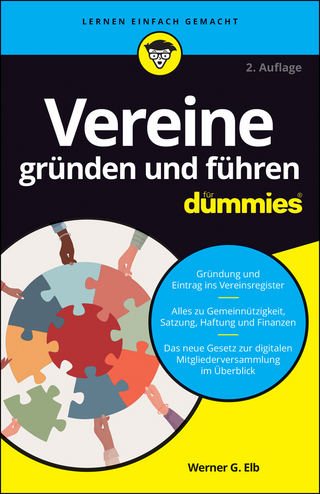
Project Manager Street Smarts
John Wiley & Sons Ltd (Verlag)
978-0-470-47959-9 (ISBN)
- Titel ist leider vergriffen;
keine Neuauflage - Artikel merken
Hands-on practice for the most common-and most difficult-project management tasks Breaking into the field of project management is difficult, and the Project Management Institute requires that Project Management Professionals (PMPs) have on-the-job experience before earning their certification. This handy, task-based resource addresses the most common and the most challenging tasks Project Managers face and demonstrates how to perform these tasks. The Street Smarts series is designed to help current or aspiring professionals put their certification to work for them. Full of practical, real world scenarios, each book features actual tasks from the field and then offers step-by-step exercises that teach the skills necessary to complete those tasks.
* Aimed at anyone looking to gain hands-on experience in the field of project management by offering a unique look at the daily routine of a project manager * Offers a variety of real-world scenarios, covering everything from the most common tasks to the most demanding roadblocks * Walks you through step-by-step instructions of working with a project: initiating, planning, executing, monitoring and controlling, and closing * Demonstrates defining a scope, developing a project charter, creating the work breakdown structure, managing resource allocation, and more Designed to provide you with an accurate look into the field of project management, this book offers you a unique and insightful perspective on the demands of a project manager on a day-to-day basis.
Linda Kretz Zaval, PMP, is owner and managing member of 20/20 Solutions, LLC. An active member of the Project Management Institute (PMI), she is an internationally sought-after public speaker, project management instructor, and consultant. Terri Wagner, PMP, is President and founder of Mentor Source, Inc. She has taught project management in the United States, Canada, the Caribbean, and Europe.
Introduction. Phase 1 Initiating Process. Task 1.1: Understanding Finance Principles. Scenario. Scope of Task. Procedure. Task 1.2: Understanding Project Selection Methods. Task 1.3: Using Business Cases with Built-in Feasibility Analysis. Task 1.4: Identifying Stakeholders-Who Are They? Task 1.5: Conducting a Stakeholder Analysis. Task 1.6: Understanding Corporate Strategy. Task 1.7: Creating the Scope Statement. Task 1.8: Creating the Project Charter. Phase 2 Planning Process. Task 2.1: Identifying Team Members. Task 2.2: Assigning Responsibilities in the Planning Phase. Task 2.3: Creating the Project Organizational Structure. Task 2.4: Developing a Communication Plan. Task 2.5: Creating the Work Breakdown Structure. Task 2.6: Creating Subsidiary Plans. Task 2.7: Managing Project Risks. Task 2.8: Creating the Master Project Management Plan. Task 2.9: Obtaining Plan Approval. Task 2.10: Developing a Change Management Plan. Phase 3 Executing Process. Task 3.1: Directing and Managing Project Execution. Task 3.2: Acquiring the Project Team. Task 3.3: Developing the Project Team. Task 3.4: Managing the Project Team. Task 3.5: Providing Quality Assurance. Task 3.6: Executing the Communications Plan. Task 3.7: Conducting Procurements. Phase 4 Monitoring and Controlling Process. Task 4.1: Monitoring and Controlling Project Work. Task 4.2: Managing Risks. Task 4.3: Administering Procurements. Phase 5 Closing Process. Task 5.1: Formalizing Project Acceptance. Task 5.2: Performing Personnel Performance Reviews. Task 5.3: Obtaining Contract Closure. Task 5.4: Understanding the Lessons Learned. Task 5.5: Creating and Distributing Final Reports. Appendix A Solutions. Phase 1 Solutions. Hands-on 1.1: Testing Your Knowledge of Finance Principals. Hands-on 1.2: Testing Your Knowledge of NPV. Hands-on 1.3: Testing Your Knowledge of Benefit Measurement Methods-Scoring Models. Hands-on 1.4: Testing Your Knowledge of Business Cases. Hands-on 1.5: Testing Your Knowledge of Leadership Analysis. Hands-on 1.6: Testing Your Knowledge of Stakeholder Analysis. Hands-on 1.7: Testing Your Knowledge of Stakeholder Mapping. Hands-on 1.8: Testing Your Knowledge of Corporate Strategy. Hands-on 1.9: Testing Your Knowledge of Goals and Objectives. Hands-on 1.10: Testing Your Knowledge of the Product Scope Description. Hands-on 1.11: Testing Your Knowledge of Deliverables. Hands-on 1.12: Testing Your Knowledge of Requirements. Hands-on 1.13: Testing Your Knowledge of Project Boundaries. Hands-on 1.14: Testing Your Knowledge of Product Acceptance Criteria. Hands-on 1.15: Testing Your Knowledge of Project Organizational Structures. Hands-on 1.16: Testing Your Knowledge of Project Scope Statements. Hands-on 1.17: Testing Your Knowledge of Milestones. Hands-on 1.18: Testing Your Knowledge of an Estimated Budget. Hands-on 1.19: Testing Your Knowledge of High-Level Project Risks. Hands-on 1.20: Testing Your Knowledge of Project Assumptions. Hands-on 1.21: Testing Your Knowledge of Project Constraints. Hands-on 1.22: Testing Your Knowledge of Putting It All Together! Phase 2 Solutions. Hands-on 2.1: Testing Your Knowledge of Identifying Team Members. Hands-on 2.2: Testing Your Knowledge of Roles and Responsibilities in the Planning Phase. Hands-on 2.3: Testing Your Knowledge of Project Organizational Structures. Hands-on 2.4: Testing Your Knowledge of Communications. Hands-on 2.5: Testing Your Knowledge of Creating a List of Work. Hands-on 2.6: Testing Your Knowledge of Organizing Tasks into Logical Groupings. Hands-on 2.7: Testing Your Knowledge of Reviewing and Adjusting a WBS. Hands-on 2.8: Testing Your Knowledge of Staffing Risks. Hands-on 2.9: Testing Your Knowledge of Network Logic. Hands-on 2.10: Testing Your Knowledge of PERT. Hands-on 2.11: Testing Your Knowledge of Reducing a Project's Duration. Hands-on 2.12: Testing Your Knowledge of Cost Budgeting. Hands-on 2.13: Testing Your Knowledge of Quality Planning. Hands-on 2.14: Testing Your Knowledge of Contract Types. Hands-on 2.15: Testing Your Knowledge of Contract Calculations. Hands-on 2.16: Testing Your Knowledge of Identifying and Qualifying Risk Events. Hands-on 2.17: Testing Your Knowledge of Decision Trees and NPV. Phase 3 Solutions. Hands-on 3.1: Testing Your Knowledge of Expertise. Hands-on 3.2: Testing Your Knowledge of PMIS. Hands-on 3.3: Testing Your Knowledge of Acquiring Resources. Hands-on 3.4: Testing Your Knowledge of Developing Your Project Team. Hands-on 3.5: Testing Your Knowledge of Managing Your Project Team. Hands-on 3.6: Testing Your Knowledge of Motivational Theories. Hands-on 3.7: Testing Your Knowledge of Types of Power. Hands-on 3.8: Testing Your Knowledge of Managing Conflict. Hands-on 3.9: Testing Your Knowledge of Quality Assurance. Hands-on 3.10: Testing your Knowledge of Communicating with Your Sponsor and Team. Hands-on 3.11: Testing Your Expectations and Commitments. Hands-on 3.12: Testing Your Knowledge of Listening Habits. Hands-on 3.13: Testing Your Knowledge of Conduct Procurements. Hands-on 3.14: Testing Your Knowledge of Contract Negotiations. Phase 4 Solutions. Hands-On Exercise 4.1: Testing Your Knowledge of Integrated Change Control. Hands-On Exercise 4.2: Testing Your Knowledge of Scope Verification. Hands-On Exercise 4.3: Testing Your Knowledge of Controlling Project Scope. Hands-On Exercise 4.4: Testing Your Knowledge of Controlling the Project Schedule. Hands-On Exercise 4.5: Testing Your Knowledge of Earned Value Concepts. Hands-On Exercise 4.6: Testing Your Knowledge of Quality Tools. Hands-On Exercise 4.7: Testing Your Knowledge of Performance Reporting. Hands-On Exercise 4.8: Testing Your Knowledge of Managing Risk Events. Hands-On Exercise 4.9: Testing Your Knowledge of Contract Changes. Hands-On Exercise 4.10: Testing Your Knowledge of Legal Contract Issues. Phase 5 Solutions. Hands-on 5.1: Testing Your Knowledge of Project Acceptance. Hands-on 5.2: Testing Your Knowledge of Performance Reviews. Hands-on 5.3: Testing Your Knowledge of Contract Closure. Hands-on 5.4: Testing Your Knowledge of Lessons Learned. Hands-on 5.5: Testing Your Knowledge of Creating and Documenting the Project's Final Report. Index.
| Erscheint lt. Verlag | 3.7.2009 |
|---|---|
| Zusatzinfo | Illustrations |
| Verlagsort | Chichester |
| Sprache | englisch |
| Maße | 188 x 235 mm |
| Gewicht | 608 g |
| Einbandart | Paperback |
| Themenwelt | Sachbuch/Ratgeber ► Beruf / Finanzen / Recht / Wirtschaft ► Wirtschaft |
| Wirtschaft ► Betriebswirtschaft / Management ► Projektmanagement | |
| ISBN-10 | 0-470-47959-0 / 0470479590 |
| ISBN-13 | 978-0-470-47959-9 / 9780470479599 |
| Zustand | Neuware |
| Haben Sie eine Frage zum Produkt? |
aus dem Bereich


